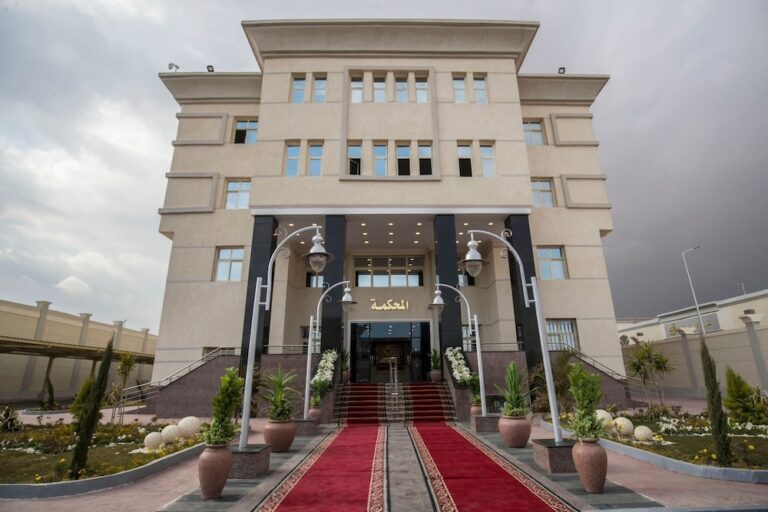In a statement released by CIHRS, organisations condemn the recent revival and expansion of the emergency law by the Supreme Council of the Armed Forces, which constitutes a direct threat to freedom of expression.
(CIHRS/IFEX) – The undersigned rights organizations decisively condemn the exploitation of the political crisis between the forces of the revolution and the transitional authorities as an excuse to employ the same repressive tools and means that the regime of deposed president Hosni Mubarak used against its enemies and critics foregoing dialogue, negotiations, and political solutions in favor of the old security approach. Such security solutions lead to violence, oppression, and an increasing use of repressive legislation against opponents, be they political activists, media workers, or civil society and rights activists.
Regrettably, the policies recently embraced by the Supreme Council of the Armed Forces (SCAF) and the government that heeds its dictates have increased political tensions in the country. They have served to strengthen the belief that a vast gulf separates, on one hand, the aspirations of Egyptians for democracy, through a clean break with the legacies and practices of the previous despotic regime, and, on the other, the tendencies of those administering the country’s affairs, who are clearly and gradually preserving the primary components of the deposed president’s regime while attempting to give it a facelift by sacrificing several old regime figures. This is an insult to the thousands who sacrificed and died in a vicious battle to overthrow the entire regime, not for the sake of a few new faces.
The undersigned forcefully condemn SCAF Decree 193/2011, which not only revived the application of the emergency law – which has officially been in force since the Mubarak era – but also expanded the scope of the law to exceed the limits guaranteed in 2010 by the deposed president, who vowed to apply the law only in the context of crimes of terrorism and drug-trafficking. The SCAF’s decision allows the emergency law to be invoked for disturbances to national security and the public order and to confront acts of ‘thuggery’, assaults on the freedom to work, vandalism of facilities, the obstruction of transportation and roads, and the dissemination of false news and statements.
The expansive language of the decree permits a broad interpretation of such acts that will allow for the intimidation and harassment of persons involved in peaceful protests, demonstrations, and strikes. It also constitutes a direct threat to freedom of expression and a free media.
We, the undersigned, believe that the use of the emergency law to stifle basic liberties and to repress actions by forces of the revolution cannot be viewed separately from the broad, escalating assault on civil society institutions and various media outlets.
(. . .)
The undersigned organizations fully appreciate the important role played by the SCAF in securing the early successes of the Egyptian revolution, namely removing Mubarak and the symbols of his rule. We still hope that the SCAF will assume its responsibilities to achieve the democratic aims expressed by the Egyptian revolution, from which the SCAF derives its legitimacy in this transitional period. We emphasize that securing a safe transition to democracy requires those currently administering the country’s affairs to open up the public sphere to a democratic, equitable, institutional dialogue among all active parties in society, in order to reach a social consensus on the political system and the course it will take.
We, the undersigned, caution that reluctance to build channels of communication and dialogue is liable to lead the country toward deeper insecurity and violence and undermine the chances for political stability
We believe that constructing channels of dialogue and communication with various political forces and civil society institutions requires the following urgent steps:
1. Revoke the SCAF’s decision to activate and expand the emergency law, end the state of emergency, and abolish the law criminalizing strikes and sit-ins.
2. Suspend all exceptional trials, including trials of civilians in military courts and all trials in the Emergency Supreme State Security Court.
3. Abolish the Ministry of Information and end the attack on the media and media freedoms.
4. End the hostile, systematic campaigns against civil society organizations and rights groups and officially announce the findings of the investigations allegedly conducted into the blanket allegations leveled against all civil society groups.
5. Reconsider the electoral system and electoral districting to be responsive to widespread demands for an unconditional, proportional list system in all seats in elections for the People’s Assembly and Shura Council.
6. Release a time-bound agenda for the transitional period that includes specific dates for parliamentary and presidential elections and a referendum on the new constitution.
Click here to read the full report
Andalus Center for Tolerance and Anti-Violence Studies
Arab Penal Reform Organization
Association for Freedom of Thought and Expression
Center for Egyptian Women’s Legal Assistance
Center for Trade Union and Workers’ Services
Egyptian Association for Community Participation Enhancement
Egyptian Center for Economic and Social Rights
Egyptian Center for Woman’s Rights
Egyptian Democratic Academy
Egyptian Foundation for the Advancement of Childhood Conditions
Egyptian Initiative for Personal Rights
Egyptians Against Religious Discrimination
Hisham Mubarak Law Center
Land Center for Human Rights
Nazra for Feminist Studies
New Woman Research Center
The Human Rights Association for the Assistance of the Prisoners
The Human Rights Association for the Assistance of the Prisoners
United Group, Attorneys at law, Legal Researchers & Human Rights Advocates


